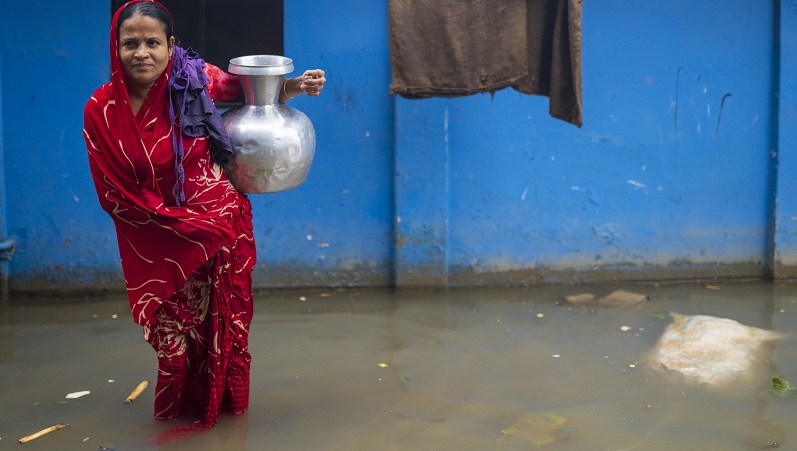Aid agencies are struggling to respond to deadly flooding in Bangladesh and India after wealthy governments diverted aid funding to the Covid-19 crisis and the war in Ukraine.
Heavy rain began in northern Bangladesh and north-east India on Saturday, killing at least 32 people and forcing millions to flee from their homes.
The intensity of the rain took aid agencies and residents by surprise. “The flood caught us off guard because the extent was enormous,” WaterAid’s Bangladesh director Hossain Adib told Climate Home News.
“This is monsoon season but what climate change has resulted in is more than normal rainfall,” added Sudipto Mukerjee, Bangladesh representative at the UN Development Programme (UNDP).

A family in Sylhet sit in their flooded home (Photo: WaterAid/Drik/Sultan Mahmud Mukut)
Both Adib and Mukerjee told Climate Home that the Covid pandemic and the war in Ukraine had diverted funds away from their budgets.
UNDP’s disaster response and recovery facility, whose biggest funders are the UN, Sweden and Canada, had a budget of $11m in 2020. This fell to $7.5m in 2021 and $6.8m in 2022.
The dwindling funds are stretched increasingly thin. They have been used to provide protective equipment for Covid-19 and respond to the Rohingya refugee crisis as well as weather-related disasters.

The budget of the UNDP’s disaster response and recovery facility (Photo: UNDP/Screenshot)
With limited cash, mobile communications disrupted and the airport’s runway flooded, the Bangladeshi government and aid agencies are struggling to respond quickly to the emergency. Local community groups, including young climate activists affiliated to Fridays for Future, have stepped into the gap.
Siyam Afzal said he and other activists from YouthNet for Climate Justice launched an online appeal and used the money to buy food, medicine and drinking water to give people in overcrowded shelters. The intensity of the floods has left even designated ‘flood shelters’ flooded, meaning only a few are safe for people to us.
Hospitals too have flooded, making it harder for injured people to find medical care. Afzal met one child whose injured leg was splinted with a piece of bamboo and some plastic yarn. “He was crying badly,” Afzal said.

An injured boy has a leg splint made from bamboo and plastic yarn. (Photo: Syed Afzal Siyam)
At the UN climate talks last week in Bonn, Germany, developing countries argued that the humanitarian aid system was inadequate to respond to climate disasters.
They pushed for a facility to be set up that would source funds from rich countries to help poorer ones respond and recover to climate disasters which they had a disproportionately small role in causing.
Developing countries pushed to get the issue on the formal agenda for the talks but were defeated by rich nation opposition.
In the wake of the floods, climate campaigners and humanitarian workers in Bangladesh called for developed countries to deliver loss and damage finance. Mukerjee, of UNDP, explained that Bangladesh has a good track record of rolling out measures that have minimised deaths from floods. But communities still suffer from losses and damages to infrastructure, including houses, schools, hospitals and roads.
“If there is a direct link between a disaster and climate change…there is a need for the global community to be able to help countries like Bangladesh deal with the consequences of climate change,” he said.
